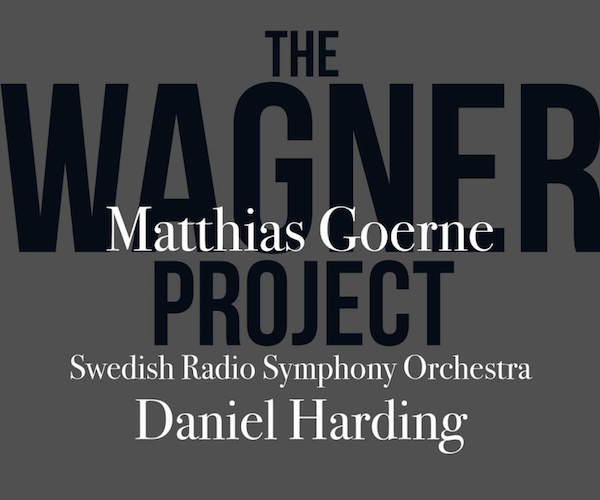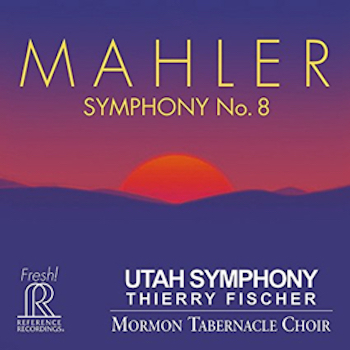Classical CD Reviews: Matthias Goerne’s “The Wagner Project” and Mahler’s Symphony of a Thousand
Matthias Goerne offers more proof that he is the Wagner baritone of the day. And Thierry Fischer’s understanding of Mahler deserves our admiration.

By Jonathan Blumhofer
Matthias Goerne’s the Wagner baritone of the day. And Daniel Harding and the Swedish Radio Symphony Orchestra (SRSO) can hold their own with anybody in Wagner. Those are the two big takeaways from The Wagner Project, a handsome double-disc set from Harmonia mundi showcasing Goerne in monologues and arias spanning Der fliegende Holländer to Parsifal.
Goerne’s quite extraordinary in it all. And “extraordinary” shouldn’t be confused with “predictable,” even given how many baritones have sung (and recorded) this repertoire. Goerne’s anything but the latter. His Wotan, for instance, is as tender and human as Hans Hotter’s was for Solti – but with an instrument that, at this point in his career, is far smoother and more lyrical. His “Leb’ wohl, du kühnes, herrliches Kind” with Harding is pure magic: velvet-toned, soulful, and tragic. “Abendlich strahlt der Sonne” is similarly majestic but tinged with sadness.
Indeed, it’s the melancholy in many of these parts that stands out in Goerne’s interpretations. Granted, it’s not forced – König Marke and Amfortas are, in their ways, pensive, wistful characters – and Goerne’s “Tatest du wirklich?” (from Tristan) and “Ja – Wehe! Wehe! Weh’ über mich!” (from Parsifal) are marked by plenty of pathos. So, rather surprisingly, is his “Flieder-Monolog,” Hans Sachs’ big aria from Act 2 of Die Meistersinger. But such a thoughtful interpretation is perfectly in line with the character. The same can be said for Goerne’s take on Wolfram’s “Wie Todesahnung” (from Tannhäser). That said, “Die Frist ist um” (from Holländer) packs furious passion and energy.
Harding and the SRSO play throughout with panache and color. They accompany Goerne sensitively and split the album just about evenly with him, playing the Act 3 Prelude from Meistersinger, plus the Holländer Overture, Tristan Prelude and Liebestod, and Parsifal Act 1 Prelude and Karfreitags-Zauber. The ensemble’s terrific in all of it, by turns mighty (the Holländer Overture is particularly snappy), mysterious (Parsifal), sensuous (in Tristan), and serene (the Meistersinger and Karfreitags excerpts).
In fact, the only real criticism to be lodged has more to do with Wagner’s concept of opera than any problem with the interpretations. Namely, that there’s no escaping the choppiness of these excerpts: they’re all, with the exception of “Leb’ wohl,” rather wrenched out of context and, as presented here with no smoothing out, sometimes simply stop, mid-thought (“Tatest du wirklich?” being maybe the most egregious example). Perhaps Goerne, Harding, and the SRSO can remedy that dilemma by next tackling some complete Wagner operas. I’d stand in line for them.

There’s little more you can do with Thierry Fischer’s understanding of Mahler than to admire it. The sense of phrasing, pacing, understanding of instrumental colors – he’s a top-notch Mahler conductor, which much of his new recording of the composer’s sprawling Symphony no. 8 demonstrates.
It surely helps that the Utah Symphony is such a responsive and brilliant orchestra. Whether navigating Mahler’s busy accompanimental writing in Part 1 or reveling in the occasional purely-orchestral episodes of Part 2, this is an ensemble that’s playing as well as (actually, probably better than) it did back in the day for Maurice Abravanel; its recorded sound nowadays is surely much improved.
The weak link in this performance, as it were, is the Mormon Tabernacle Choir (MTC), which acquits itself well in the score’s more static moments (e.g. Part 2’s “Waldung, sie schwankt heran”) but finds itself thrown for a loss in the busy, polyphonic sections (which is to say, much of Part 1). In addition to lacking the virtuosity of the Wiener Singverein and -Staatsopernchor in Solti’s landmark recording, or the London Symphony Chorus in Bernstein’s, the MTC also struggles a bit with Latin and (especially) German diction.
Granted, just about every choir that tackles Mahler Eight runs into some of these difficulties. Some overcome them better than others and the MTC does bring a certain warmth and tonal balance to this performance that is more than welcome. Still, it’s hard not to draw comparisons. Do its technical shortcomings detract from everything else going on here? That’s an open question.
That said, the textures – choral and orchestral – Fischer draws out of the score are consistently clean and clear. Indeed, his take on the instrumental prelude to Part 2 is nothing short of fantastic: it’s one of the best I’ve ever heard, played with terrific energy and direction. And the closing “Alles vergängliche” is thrilling.
On top of that, this performance’s eight soloists are phenomenal. The trio of male singers – tenor Barry Banks, baritone Markus Werba, and bass Jordan Bisch – is particularly stellar, singing with passion and intensity throughout. Banks’ Doktor Marianus, for one, turns in a particularly robust “Höchste Herrscherin der Welt!” The women – sopranos Orla Boylan, Celena Shafter, and Amy Owens; mezzos Charlotte Hellekant and Tamara Mumfor – are similarly fervent.
So, from an interpretive standpoint, we’ve got a great Mahler Eight. Ditto for the engineering, which is excellently balanced and draws out the score’s many details, from rippling harp argeggios to extended violin solos (all excellently and sensitively rendered by acting concertmaster Madeline Adkins). Technically, too, there’s much to like, though the choral singing is bettered in certain other accounts. That’s a potential problem, though if it’s not one for you (and it might not be), have at it.
Jonathan Blumhofer is a composer and violist who has been active in the greater Boston area since 2004. His music has received numerous awards and been performed by various ensembles, including the American Composers Orchestra, Kiev Philharmonic, Camerata Chicago, Xanthos Ensemble, and Juventas New Music Group. Since receiving his doctorate from Boston University in 2010, Jon has taught at Clark University, Worcester Polytechnic Institute, and online for the University of Phoenix, in addition to writing music criticism for the Worcester Telegram & Gazette.
Tagged: Harmonia Mundi, MAHLER, Matthias Goerne, Reference Recordings, Symphony of a Thousand
